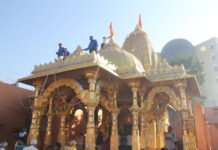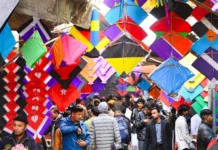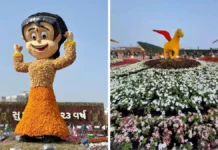
For the connoisseurs of South-Asian literature written in English, the book “Midnight’s Children” has to rank near the very top. The novel which launched the career of Salman Rushdie in 1981 not only won the prestigious Man Booker Prize soon after its release but The Booker of Bookers award as well in 1993 for best book in the 25 years of Booker history. And if that was not enough, it won the Best of the Booker award in 2008 marking 40 years of that prize.
Keeping such a background in mind and the length of the novel, when this scribe heard that Midnight’s Children was being made into a single movie, the first thought that came to mind was “not possible”. Others who have read the book may or may not agree but this is not just the story of Saleem Sinai and his many friends but an epic directly related to two countries, India and Pakistan and includes the birth of a third, Bangladesh. There is just too much in this “factional” tale to condense into a single screenplay, but Salman Rushdie has done exactly that and quite successfully here.
Stepping forward and taking the challenge to make this film, Director Deepa Mehta (of Fire, Earth and Water fame) had a lot on her mind during a phone interview on the making of Midnight’s Children. An abbreviated form of the exchange is presented below:
Ras: One can think of few other books more challenging to make a movie on. What made you choose the Midnight’s Children story to make into a film?
Deepa: It’s a great story. Saleem Sinai born at midnight on India’s independence, and the subsequent turn of events making it his personal and also a national journey. Anybody can relate to it. I’m so glad that Salman wrote the script for it.
Ras: How did you come to choose actor Satya Bhabha to play Saleem, the lead role in the movie?
Deepa: I saw him in a play and in a film. He is a great actor of mixed heritage. His father is Indian and his mother European. The character Saleem Sinai is Anglo-Indian so I wanted to have that look.
Ras: What were you looking for in the actor who played Shiva?
Deepa: The dark side, I was looking for somebody who looks very powerful. Shiva is all about power, quite the opposite of Saleem.
Ras: The roles of women in the movie appear to be stronger than those in the book. Was that by choice or are some of us looking too much into their presence?
Deepa: One of the reasons I was attracted to the book was because of its powerful women characters. As a Director, I have always been attracted to strong female roles like those in this movie. The role of Naseem played by Shabana Azmi for instance. The characters Parvati, Emerald and The Prime Minister etc. are all about strong women.
Ras: One of my favorite characters in the book Midnight’s Children had to be Picture Singh, but somehow his presence in the film appears subdued. Did you have any constraints regarding the length of this movie so that not all characters could be fully explored?
Deepa: I have to disagree. Every character got the time that we felt was needed in the film.
Ras: What are your expectations from this movie? Was it somewhat challenging to find distributors earlier in spite of or due to the Rushdie name attached to the movie?
Deepa: No challenges at all. We have had distribution since the day that it was framed. This is the way it is done.
Ras: Do you think that South-Asians will continue to see many more films related to Partition?
Deepa: I have no idea. How do we know? People are still making movies about the Jewish Holocaust and will continue to do so because they have a powerful message to convey. Similarly the horrors of Partition contain a lesson and a grim reminder for us not to make the same mistake again.
The Movie
And now on to the movie which begins once upon a time (as narrated by Salman Rushdie) at Dal Lake in Kashmir in the year 1917 when Aadam Aziz (Rajat Kapoor), Saleem Sinai’s “grandfather” embarks on a Hol(e)y romance with a young lady patient named Naseem under the watchful “eye” of her father Ghani Sahib (Anupam Kher). Aadam who is blessed with an imposing nose with “Dynasties waiting inside it,” is anxiously waiting for his patient to have a headache.
Aadam and Naseem (Shabana Azmi) get married, settle down in Agra in to get caught up in the emotions of the partition of British India along with their daughters Alia, Mumtaz and Emerald. After a political murder, a poet of questionable potency by the name of Nadir Khan (Zaib Shaikh) hides underground in the Sinai house and befriends Mumtaz (Shahana Goswami).
In a house where mother Naseem takes a vow of silence but has the ability to invade the dreams of her daughters in which the lovely Emerald (Anita Majumdar) finds the confident and dashing Major Zulfikar (Rahul Bose) and Alia dreams of Ahmed Sinai (Ronit Roy). Naseem and Nadir tie the knot but all is not what is supposed to be since story, family and genetics take unexpected turns as Ahmed Sinai enters Naseem’s life, transforms her into Amina Sinai, and moves with her to Bombay.
Partition fast approaches and Buckingham Villa, a residence in Bombay is sold to the Sinai’s by an Englishman by the name of William Methwold (Charles Dance) who appears to be doing a lot more than keeping the empire alive during its dying days besides listening to a street singer named Wee Willie Winkie and his wife Anita.
The midnight hour of India’s independence arrives and two children are born in the same hospital at around the same time to Amina Sinai and Anita, to be named Saleem and Shiva, an opportunity for to a nurse by the name of Mary Pereira (Seema Biswas) to change history for love. Partition happens; “Pakistan and India were born washing themselves in one another’s blood,” narrates Rushdie.
From that midnight when Jawaharlal Nehru’s “Tryst with Destiny” begins, 1001 children are born close to that time, each having special powers with the ones arriving into the world closest to midnight being the ones most powerfully gifted. Saleem the gentle rich kid and Shiva the hatefully strong poor one, the two opposites born at midnight become the leaders of Midnight’s Children and from then on the history of India (and to some extent Pakistan) becomes their life story.
Saleem and Shiva have a parting as Saleem moves to Pakistan (where he assists in the 1958 coup) and Shiva remains in India joining the military. The other prominent characters are Picture Singh (Kulbhushan Kharbanda) “The most charming man in the world” and Parvati – the witch who was born 7 seconds after midnight, “sister” Jamila (Soha Ali Khan) and last but not least The Prime Minister (Sarita Choudhury).
It is in Dacca (now Dhaka) and 1971 during the birth of Bangladesh that Saleem, Shiva and Parvati reunite to move back to Delhi with the help of magic. It is a time when India’s democracy comes under attack and a long period of darkness follows during which Midnight’s Children are targeted for elimination.
Satya Bhabha is a convincing Saleem, his role being that of a weak hero and Siddharth plays a powerfully violent Shiva, but the Parvati, Mumtaz, Emerald and Jamila characters also shine in this movie. The musical score is well done and the lyrics for songs including those by Ghalib and Faiz certainly add to the attractiveness of this film.
To conclude here “Midnight’s Children” the movie succeeds in its attempt to convert a South-Asian epic into a single film. This book could easily have become a trilogy but Deepa and Salman have made it work as a single effort. And after having watched it more than once (the luxuries of being the reviewer) one has to concede the earlier point on Picture Singh to Deepa. His character is warm and generous and well-acted. What is missing is the symbolic “Chutney” of the Left, like in the book. Rushdie seems to have somewhat diluted its politics even though his radical spittoon is ever present!
Ras H. Siddiqui






